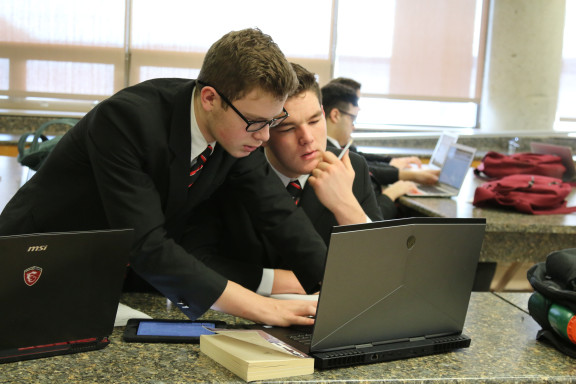50p

Lifelong Skills In Health 10
We believe that it is important to prepare our students for all aspects of their futures, which includes entering the workforce. Additionally, the Brentwood graduation program mandates that students acquire a minimum of 30 hours of work experience between grades 10 and 12. A combination of these reasons is why we introduced two new sessions into the Health 10 program this year: resume writing and interview skills.
Our objective is to help students transition into the workplace by assessing the knowledge, skills and abilities (KSAs) they have accumulated through their time at Brentwood, extra-curricular activities, and summer work experience. We are confident that our students will be well equipped for the jobs they are preparing for, however, we want to also ensure they understand how to best present themselves and their KSAs to land their dream job.
As we dove into the dynamic world of resume writing, students learned how to construct both a chronological and functional resume, while acknowledging which type will best outline their skill sets at different points of their careers. Additionally, we learned about buzzwords, tailoring a resume to the job posting they are applying for, and the importance of formatting, spelling and grammar. Next, we spoke about how a cover letter allows them to target the job and employer in a specific way, and that a cover letter is the first point of contact they will have with an employer. We then learned how to properly format a cover letter, and the main points to include while writing a cover letter, such as acknowledging where they found the job posting or who referred them, how they would be an ideal candidate for the vacancy they are filling, why they want to work for that organization, thanking the employer and indicating how they would like to be in contact soon to further the employment process.
After conquering resume writing, we introduced the topic of interview skills. Students became knowledgeable on the different types of interview questions that they may be asked in the process of solidifying a job, such as behavioral and situational. Behavioral interview questions focus on the past, and how they previously dealt with a situation (showing their KSAs), whereas situational interview questions focus on the future, and how they would handle a specific situation that may arise in the job they are applying for (showing their problem-solving skills by using the STAR technique (situation, task, action, result). We also recognized the differences in approaching panel interviews to singular interview, as well as some strategic tips: remembering the interviewer(s) names and acknowledge them by name, looking the interviewers in the eyes while engaging, and following-up with an appreciation message post-interview.
The students will continue their learning in this area by constructing their own resume during their adviser meetings, with the help of their Advisers and Health 10 teachers. Our aim is to have each student in Grade 10 have an up-to-date resume by the end of the school year. This will provide them with a platform to build off of in the future. We are optimistic that their resume, combined with their currently knowledge of resume building, cover letters and interview skills will support their future job seeking preparation and employment. As Cornerstone pointed out in their article School Performance: Preparing Kids to Enter the Workforce “The transition from going to school to entering the workforce can be scary but if kids are armed with the right knowledge and skills, they can make a smooth transition. When parents and teachers work together to prepare kids for adulthood, they will have the confidence needed to succeed in their career field”.